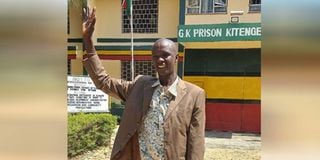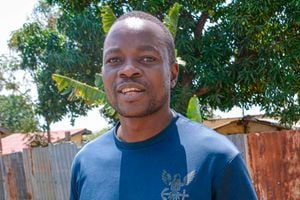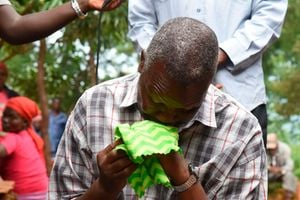
Daniel Mbithoka walks out of Kitengela GK Prison on September 27, 2024, after serving 20 years.
At 11am on Friday, September 27, 2024, the creaking and yanking of the front door of Kitengela GK Prison in Kajiado County ushered in a new phase of life for Daniel Mbithoka Muia, 47, after serving a 20-year sentence.
Dressed in a brown coat, floral shirt, grey trousers and a pair of black shoes, the father of four walked majestically out with a bag in his left hand, his right hand waving wildly to mark his sweet walk to freedom.
Standing outside the prison's main entrance were Mbithoka's wife Ruth, his 70-year-old mother Loise Kavoli Muia and a handful of friends, all eager to welcome him back to freedom.
In a moment, the trio (son, mother and wife) embraced and held each other in silence as tears of joy rolled down their cheeks.
Once a faint, almost impossible dream, their reunion after more than 10 years of separation had come true.
For Mbithoka, September 28, 2010, remains a dark day. His bright afternoon was interrupted by dark clouds when police officers arrested him at his home in Utaati village, Makueni County, on charges of defilement. He had allegedly defiled a 14-year-old girl.
In an interview with the Nation, a remorseful Mbithoka said that after his arrest he was detained at Kilala Police Station in Makueni County before being remanded at Makueni GK Prison while the case was being heard.
On May 27, 2011, the Makueni Magistrate's Court found the former matatu tout guilty and sentenced him to 25 years imprisonment.
"On that day of my imprisonment, I felt as if someone was pulling the ground out from under my feet. I felt a cold bead of sweat running down my spine," recalls the reformed convict.
Kamiti Maximum GK Prison
"My wife stared at me and as our eyes locked, tears rolled down our cheeks.
From the courtroom, Mbithoka was sent to cool his heels at Makueni GK Prison before being transferred to Kamiti Maximum GK Prison in 2011.
In 2013, he appealed his sentence at the High Court in Machakos and his jail term was reduced to 20 years and he was transferred to Kamiti Medium Prison.
In November 2014, he was transferred to Kitengela GK Prison where he completed his sentence. In total, he served 14 years after his sentence was reduced by a third for good behaviour behind bars.
Although he claims that life behind bars is not for the faint-hearted, he was able to train as a carpenter, was saved and began preaching the gospel to his fellow inmates. Towards the end of his sentence, he was promoted to trustee for good behaviour.
"Life in prison is like swimming against the tide. Nowadays, inmates benefit from transformation programmes. I've accepted my mistakes and I'm ready to move on with my life. I'm now a preacher and a Grade Three carpenter," said the Standard Six dropout.
Mbithoka is optimistic that society will accept him back as a reformed person and urges the youth to shun crime.

Daniel Mbithoka (right), accompanied by his wife Ruth Mbithoka (centre), mother Loise Kavoli (left) and friends, leaves Kitengela GK Prison on September 27, 2024, after serving a 20-year sentence.
"Let's avoid crime. It doesn't pay at all," he said before his wife interrupted him to answer a phone call, possibly from a relative back home where a feast had been prepared for him.
Later on Friday, a colourful reunion took place at his rural home in Makueni. Hundreds of villagers and local government officials attended.
Wife Ruth told the Nation that when her husband was imprisoned, she was left with the heavy burden of bringing up their four children: two boys and two girls, currently aged between 15 and 24.
"When my husband was imprisoned, I was ridiculed, but I was determined to bring up our four children. I have always done menial jobs and farming to provide for them," she said, fighting back tears.
Second chance
"I am a Christian and I know that everyone deserves a second chance. I did not give up on him," she said.
Mbithoka's mother said:" No one can understand what I feel in my heart.
It's beyond words," she said, holding her son's cheeks.
Kitengela GK prison officer in charge Chrisantus Makokha said the Inmate Integration Programme had become an important facet in the correctional process of inmates, especially after they have served their sentences.
He said the programme has adopted a holistic approach, with the Prison Service working with various stakeholders to ensure seamless integration of inmates into society without discrimination.
"Through the integration programme, inmates receive counselling to build their self-esteem and acceptance. We also ensure that the inmates are transformed and accepted by the family and society after serving their jail term," said Dr Makokha.
He further said that the prison, in partnership with faith-based organisations, has set up support mechanisms to help ex-convicts earn a living once they leave prison.
"We provide inmates who have successfully completed artisan courses with tools to start their own businesses.
Since the programme began, 98 per cent of the beneficiaries have not gone back to prison," he said.






